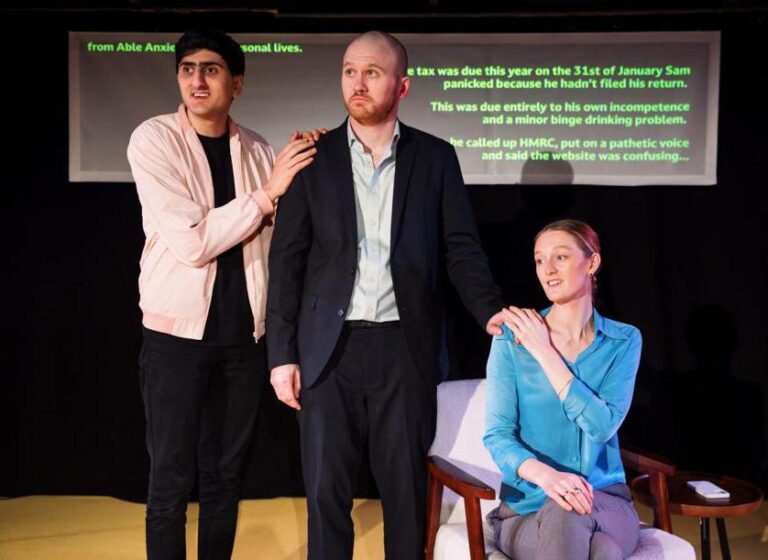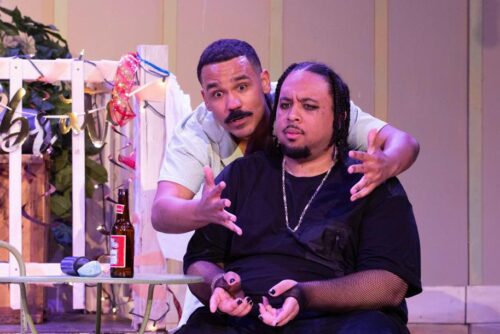Stage Review
IT’S A MOTHERF**KING PLEASURE
Written and performed by FlawBored. Directed by Josh Roche. Production by FlawBored. Presented by ArtsEmerson in association with Woolly Mammoth. At Jackie Liebergott Black Box, Emerson Paramount Center. Through April 13. Tickets $35. 617-824-8400, ArtsEmerson.org
‘Able Anxiety.’’
That’s one of the terms employed and examined in “It’s a Motherf**king Pleasure,’’ a remarkable whirlwind of a show that deconstructs attitudes towards disability, as reflected in the linguistic contortions inspired by the subject.
It’s no easy thing to create a satire this consistently funny about an issue this complicated, but the talented folks at FlawBored — a “disability-led’’ theater company based in London — have pulled it off.
The cast of three consists of Chloe Palmer, Aarian Mehrabani, and Sam Brewer, the latter two of whom are legally blind. At one point, explaining the “social model of disability,’’ Brewer says: “I, as Sam, am not disabled. Society disables me. I have an impairment and the world around me is disabling me.’’
On the page, that may seem preachy and overly on the nose. In performance, it is not. It’s spoken with a matter-of-fact insouciance.
The “Pleasure’’ cast has constructed performance personae that are both contrasting and complementary.
Palmer projects a cheerful but anxious energy, while Mehrabani’s affect runs a narrow gamut from skeptical to glum. Brewer is a study in constant, almost hectic motion, endowing his character with the swaggering confidence of a not-entirely-trustworthy game-show host.
There’s a fourth character of sorts: “John the captioner,’’ an unseen, passive-aggressive guy who’s ostensibly in charge of the script’s text, projected on an upstage screen, which runs concurrently with the dialogue. It’s fair to say that relations are tense between “John’’ and the performers, their verbal jousting slightly reminiscent of the fateful exchanges between HAL the computer and Dr. Dave Bowman (Keir Dullea) in Stanley Kubrick’s “2001: A Space Odyssey’’ (1968).
At the top of the show, each performer describes their physical appearance for the benefit of visually impaired audience members — offering a reminder to those without disabilities that access for all must be a central concern of the theater.
The play shortly transitions to an HR workshop on disability at a fictional PR talent management agency called RIZE, which specializes, Brewer informs us, in “turning people into brands.’’ One of the firm’s leading influencers has “done an ableism, very publicly,’’ plunging the company into “crisis mode.’’
With nothing more than a couple of armchairs for a set, “Pleasure’’ abounds in meta-theatrical gestures, such as offering the audience a glimpse into their writing process. At one point, Chloe pleads: “Don’t tweet about me.’’
A note on the script says that the play’s goals are to “poke fun at the monetization of identity politics’’ and “portray disabled characters as being capable of cruelty, manipulation and greed.’’
As that suggests, the success of the conceptually audacious, bracingly original “Pleasure’’ has a lot to do with their fearlessness, and that fearlessness extends to a sequence late in the 65-minute performance that is the furthest thing from funny — that is, in fact, deeply disturbing. (It’s described, not depicted.)
If it’s meant to knock the audience off-balance and pose a real-world test of any complacent assumptions we might have about disability, mission accomplished.
Don Aucoin can be reached at donald.aucoin@globe.com. Follow him @GlobeAucoin.



